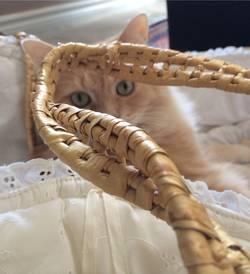
Welcoming a baby to the family is an exciting time and we should keep in mind that changes in our lifestyle may impact our pets. Cats and dogs are creatures of daily routine, so a new addition to the household can dramatically change their schedules and it is best to plan ahead.
Baby Proofing
A young child should never be left with a dog or cat unsupervised. Mitchell Vet Services recommends crating your pet, using baby gates and closing the nursery door, to prevent such situations. When your child gets older, you don’t want him/her to enter the pet’s space unless the contact is under your supervision.
You can spend time training your dog now, before the baby comes, to minimize its anxiety and ensure it continues to respond to commands once the baby is home. Your dog will need to be able to come when called, sit, calmly stay in its crate or designated area, “drop it”, take treats gently, have no teeth contact with human skin and allow any part of its body to be handled. In addition, your dog should respond to these commands from all of its family members.
Consider calming products for your pet in the home for a month before your baby is due. Offering your pet a blanket carrying the scent of your baby can give it time to familiarize itself with the new family member. Babies can make strange loud noises that may frighten your pet and it is important to use positive reinforcement to encourage your pet to remain calm. Consider having mom greet the pet before introducing baby. Initially, have one adult hold the baby while a second adult handles the pet. You want your pet to form a positive association with the baby. When your pet is calm around the baby, reward it with praise and treats.
Pet Proofing
In addition to “baby-proofing” your house, it’s important to “pet-proof” your home before the baby comes home! Prenatal vitamins may contain high doses of iron, which can lead to toxic levels of iron in a pet if consumed. Signs of toxicity include bloody vomiting and diarrhea, heart problems or even organ failure, seizures and death.
Believe it or not, some dogs find dirty diapers to be quite tasty! Disposable diapers themselves are not toxic, but due to their absorbent nature, they increase in size in the stomach and may cause an obstruction. Pacifiers and nipple shields are also at risk of causing a foreign body obstruction.
Diaper rash creams contain zinc oxide and often cause vomiting if consumed. If this product is ingested for multiple days, it also has a risk of zinc toxicity.
Vitamin D3 supplements for babies may cause fatal kidney damage to a pet unless hospitalized. Acetaminophen (Tylenol) is extremely toxic to cats even at baby dosages. It can cause death within 1 to 2 hours. The toxic dose is slightly higher in dogs, but can still be fatal even with critical veterinary intervention.
Teething products (such as Orajel) contain benzocaine, which can numb the throat and create a risk for aspiration. In cats and dogs, benzocaine metabolizes into a poisonous component that results in blood that cannot transport oxygen.
As with any potential toxin ingestion, if you believe your pet has consumed something that may be hazardous to its health, please do not hesitate to call our clinic at any time.
A little extra planning early on can go a long way to maintain a harmonious household when your bundle of joy comes home. If you have any further questions or concerns, please contact Mitchell Veterinary Services at 519-348-9711.
